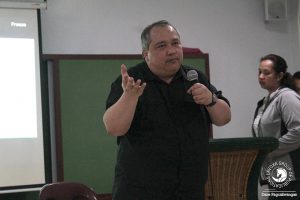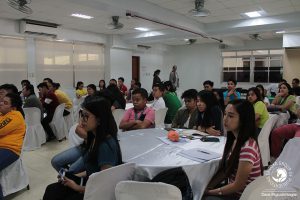

Through the initiative of De La Salle Lipa (DLSL) President and Chancellor, Br. Dante Amisola FSC, a town hall meeting with student leaders from the senior high school and college departments was conducted for students to grasp the current status of projects and institutional changes last Wednesday, Feb. 7, at MMR 7-8, Brother Benilde Building.
In his opening address, Amisola shared his vision for DLSL–to transform it in such a way that the institution can readily adapt to the challenges of the 21st century.
“If you look at our education system, we are so much behind. The educational system we have is still a product of the 18th-century needs,” he said.
He then emphasized the need to alter the way education is being provided to young people.
“We have to rethink the way we educate. Many of our schools are training you for jobs that will disappear in the next ten years. Why are we continuing that trend?” Amisola said.
Continuing the dialogue opened by the president, representatives from the Student Government (SG) and the organizations under the Council of Student Organizations (CSO) posed their concerns involving various issues and difficulties they experience in the campus.
Following is a transcript of some of the aforementioned concerns.
On student activities
Why can students no longer avail jeepney services during external activities?
We’re replacing [our school vehicles]. If you have a ten-year old vehicle, the maintenance, while good, also becomes more expensive. We have certain requirements and technically, I think if we apply the requirements for safety, jeepneys will not make it. We’re saying, “Okay, mura.” pero kapag may nangyari, sinong mananagot? Student Council officers? Hindi. School. I think that’s the point that we’re making.
Students are taking the initiative to reduce the use of paper in processing requirements for holding activities; however, transactions made through the Student Activities Office (SAO) are still running on paper.
You can do that [paperless transactions] in Canvas. It should not be a matter of whether we are going to do that [or not], it’s a matter of when we are going to do that. Too many trees are being cut. [We need] sustainability.

On community involvement sustainability
There has to be a better way. Now, we will ask you, when you go to a community, “Why are you going there? Is it a one-shot deal?” because we’re talking of sustainability. We’re looking at our engagement more carefully. What kind of impact do we want to have in these communities? When you go there, you have to know what you are looking for. Kapag sinabing malnutrition, education long-term yan. Hindi pwedeng palliative. We do not want those kinds of community involvement anymore because that is not the way to go.
And I say this publicly, I think, in my opinion, we are just using these communities to make us feel good but we’re not really doing them any good in the long term. I think that’s unfair. That is not the way we want to do this. If we want to be engaged in a community, we have to be there in the long-term. In fact, we have to look at a five-year engagement at the very least. We have to do baseline data and measurement of impact. We cannot continue these kinds of engagement where the poor remains poor but we’re happy because we have helped them.
“We cannot continue these kinds of engagement where the poor remain poor but we’re happy because we have helped them.”
You’re doing this community service, you go there only once a year and you give them false hopes. Is that the kind of involvement we want to have in our communities? Sitio Fatima has already been like that. Thirty years hence, it’s still the same and they are right beside us. That is a crime! It does not speak well of this school that they are still poor and they are beside us.
On the Digital Campus Initiatives
Pedagogy has to change. Nag-introduce kami ng Learning Management System (LMS) [but] statistics are showing us that the college faculty has not really adapted. I think the data says [only] 38% [has adapted]. Your paying for that but they are not using it. What’s wrong? Why is it that the Integrated School (IS) is a hundred percent? The way we teach has to change.
How can education be inclusive in DLSL when not all students can meet the demands of keeping up with the digital campus initiatives?
That was the first thing I was afraid of when we launched the Bring Your Own Device (BYOD) policy. How many [of our students] would actually have difficulty? I’m surprised. In fact, despite our previous fears, I have not heard of any complaints since we implemented BYOD, na [may nagsabing] “Hindi namin kaya.” We have concerns [like] ang mga scholars hindi nakakapasok, naglalakad, walang baon, walang pagkain. Alam ko yan, and that exists because I’ve talked to them. So what did we do to augment that? We have 300 scholars and we bought about a hundred of laptops which they can borrow the whole day basta ibalik nila sa hapon. I was surprised when we saw the statistics that not many [people had difficulty]. They were able to make do.
On Academics
The software used in our computer laboratories are no longer updated. When can we expect that these would be addressed?
Alam n’yo you have to bring that up because these things, hindi ito umaabot sa’kin. Maybe umaabot sa dean n’yo, I don’t know. It’s good that we heard from you.
Actually, it will all be cloud-based so that you could just download it. You are paying for it but you can only use it in school which is crazy. You pay for technology to use it in your labs, you should be able to use it even at home as long as you’re subscribed to it for the whole year. So that’s what we want to do, whether you’re [an] engineering or MMA [student], lahat dapat cloud-based.
We are experiencing issues in using our laboratories. There is lack of maintenance of equipment and some students are not able to perform laboratory experiments because custodians are no longer present during night classes.
There’s something wrong there somewhere. It’s should not be the case. Maintenance of equipment, again these are all operational things. There is an answer to that. Right now, I cannot answer you. We’re listening and we will deal with that. Of course, this should not be happening.
I’m telling you this is what keeps me awake at night because people are not doing their jobs. Those who are supposed to be maintaining these equipment should keep them in shape. Hindi pwedeng sabihing walang pera kasi kung kailangan eh di dapat gawin. Since I sat down as president, we always prioritize these things. So there is something wrong somewhere. We will find out where the problem is but it’s good you’re bringing this up.
When will Nexus Labs start incubating projects initiated by the students? Don’t you think that looking into the archived thesis projects of students would be a good start?
I love what you’re saying. Yes, we need to do that and we will do that. That’s where we want to go. In fact, the Innovation Lab is designed to incubate, accelerate and connect you [and your projects] with funders.
On the institution’s political stand
It’s really alarming how Lasallians are not aware of what’s happening or could not even make a claim in our country’s political issues. Do you have a project for a better social awareness among students to contribute in nation building? Can we expect this administration to share in the views of the Student Government and other organizations in their political stand about national issues?
Yes, of course. You know very well [that] we are with the Brothers’ stand in terms of justice, peace and clean environment. That’s very clear. We’re unabashed about it. We’ve been doing this thing before you were born. The Brothers have fought against martial law. The Brothers have fought against Erap. The Brothers have led the fight against Gloria and we have been consistent because it’s part of who we are. We’ve always expected our school to kind of follow that and I think I said before in an interview, politics change. I think you know it, Batangas voted for Duterte overwhelmingly.
“I’m very careful when it comes to politics because I don’t want to be seen as imposing our values, to our students especially.”
All I’m saying is, we are only as good as all of you here. No matter how we shout for justice, if you would not want to get involved, we can only do so much. And I hope our faculty are educating you enough to be critical. Critical, not [in the sense of] criticism but critical in the way you think of what is right and what is wrong. That’s something that we cannot impose on people. You cannot impose these values. We can only teach you, we can tell you and we can show you perhaps even, but we cannot impose these values on you. So if you say for example, “Bakit kokonti ang nakisali?” Maybe the people think that it’s not something that they want to support.
Ako, if you ask me that’s where I differ with Br. Armin. I’m saying this publicly. Alam mo naman [si] Br. Armin, vocal yan. So ako, I’m very critical of this president but I’m critical in a larger sense. I feel that this president is trying to do his best. I did not vote for Duterte but I think his economic policies are right on.
Now, are we against extra-judicial killings? Yes. I think anybody in his right mind who claims to be an administrator of a La Salle school would not agree with that. But can I impose that opinion to other people? I don’t think so. I’m very careful when it comes to politics because I don’t want to be seen as imposing our values, to our students especially. Because I think if you really want that to happen, then you have to be the ones to do that. And we will support you.
***
Despite all the issues raised by the students, Amisola reminded them to remain engaged in the implementation of their initiatives.
“These are all little stuff. [We need to keep our] eyes on the goal. Our goal is bigger than us all [which is] to create a school that will have an impact in the society. That is the long term but we need to build that now. We need to build that now,” he said.